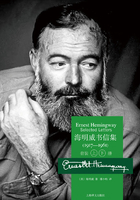Who, for instance, has duly reflected upon all the consequences of the marvellous struggle for existence which is daily and hourly going on among living beings? Not only does every animal live at the expense of some other animal or plant, but the very plants are at war. The ground is full of seeds that cannot rise into seedlings; the seedlings rob one another of air, light and water, the strongest robber winning the day, and extinguishing his competitors. Year after year, the wild animals with which man never interferes are, on the average, neither more nor less numerous than they were; and yet we know that the annual produce of every pair is from one to perhaps a million young,--so that it is mathematically certain that, on the average, as many are killed by natural causes as are born every year, and those only escape which happen to be a little better fitted to resist destruction than those which die. The individuals of a species are like the crew of a foundered ship, and none but good swimmers have a chance of reaching the land.
Such being unquestionably the necessary conditions under which living creatures exist, Mr. Darwin discovers in them the instrument of natural selection. Suppose that in the midst of this incessant competition some individuals of a species (A) present accidental variations which happen to fit them a little better than their fellows for the struggle in which they are engaged, then the chances are in favour, not only of these individuals being better nourished than the others, but of their predominating over their fellows in other ways, and of having a better chance of leaving offspring, which will of course tend to reproduce the peculiarities of their parents. Their offspring will, by a parity of reasoning, tend to predominate over their contemporaries, and there being (suppose) no room for more than one species such as A, the weaker variety will eventually be destroyed by the new destructive influence which is thrown into the scale, and the stronger will take its place. Surrounding conditions remaining unchanged, the new variety (which we may call B)--supposed, for argument's sake, to be the best adapted for these conditions which can be got out of the original stock--will remain unchanged, all accidental deviations from the type becoming at once extinguished, as less fit for their post than B itself. The tendency of B to persist will grow with its persistence through successive generations, and it will acquire all the characters of a new species.
But, on the other hand, if the conditions of life change in any degree, however slight, B may no longer be that form which is best adapted to withstand their destructive, and profit by their sustaining, influence;in which case if it should give rise to a more competent variety (C), this will take its place and become a new species; and thus, by 'natural selection', the species B and C will be successively derived from A.
That this most ingenious hypothesis enables us to give a reason for many apparent anomalies in the distribution of living beings in time and space, and that it is not contradicted by the main phenomena of life and organization appear to us to be unquestionable; and so far it must be admitted to have an immense advantage over any of its predecessors.
But it is quite another matter to affirm absolutely either the truth or falsehood of Mr. Darwin's views at the present stage of the inquiry.
Goethe has an excellent aphorism defining that state of mind which he calls 'Thatige Skepsis'a--active doubt. It is doubt which so loves truth that it neither dares rest in doubting, nor extinguish itself by unjustified belief; and we commend this state of mind to students of species, with respect to Mr. Darwin's or any other hypothesis, as to their origin. The combined investigations of another 20 years may, perhaps, enable naturalists to say whether the modifying causes and the selective power, which Mr. Darwin has satisfactorily shown to exist in nature, are competent to produce all the effects he ascribes to them, or whether, on the other hand, he has been led to over-estimate the value of his principle of natural selection, as greatly as Lamarck overestimated his vera causa of modification by exercise.
But there is, at all events, one advantage possessed by the more recent writer over his predecessor. Mr. Darwin abhors mere speculation as nature abhors a vacuum. He is as greedy of cases and precedents as any constitutional lawyer, and all the principles he lays down are capable of being brought to the test of observation and experiment. The path he bids us follow professes to be, not a mere airy track, fabricated of ideal cobwebs, but a solid and broad bridge of facts. If it be so, it will carry us safely over many a chasm in our knowledge, and lead us to a region free from the snares of those fascinating but barren Virgins, the Final Causes, against whom a high authority has so justly warned us.
"My sons, dig in the vineyard," were the last words of the old man in the fable; and, though the sons found no treasure, they made their fortunes by the grapes.
End














